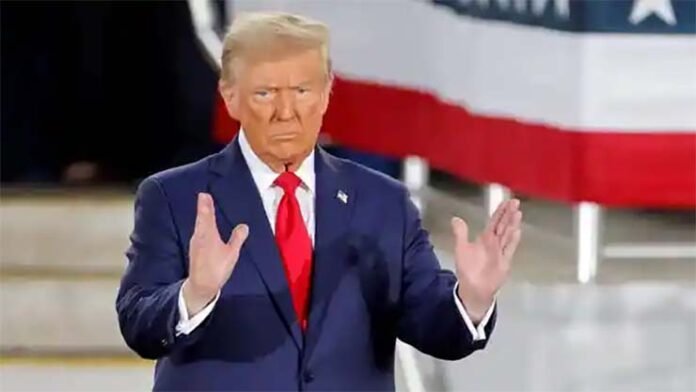United States President Donald Trump, on September 5, 2025 signed an executive order to rename the “Department of Defence” as the “Department of War,” reverting to a title it had held until after World War II. The switch is indicative of American coercion through the traditional unilateralism and exceptionalism openly stamped by aggression.
At first look, it may look semantic, but a deep dive unravels the intent and political consequences in an already conflict-ridden world. To rename is to redefine, and in renaming, Trump has framed America’s global role through a lens that is unvarnished, unapologetic, and deliberately provocative. The United States once prided itself on positioning its colossal military machine as the shield of freedom, not the sword of conquest. Now, with a single decree, Trump has declared that the age of rhetorical softening is over. America will no longer pretend.
The Power of Words in Government
Political institutions understand the weight of language. The Pentagon did not always preside over a “Department of Defence”. Before 1949, it was known as the “War Department”, an open confession of purpose, which directed American forces through both the world wars. When the Cold War dawned, however, planners in Washington opted for a semantic shift. The new “Department of Defence” expressed a posture of deterrence rather than aggression. That single lexical move fit the ideological battle of the time: America cast itself as the protector of freedom against Communist expansion, not a belligerent instigator.
Trump’s renaming throws that logic into reverse. By stripping away decades of euphemism, he invites the world to read America through the lens of blunt force. The symbolism sketches a very different nation, not a defender waiting in readiness, but a warrior on permanent footing.
It may look semantic, but a deep dive unravels the intent and political consequences in an already conflict-ridden world. To rename is to redefine, and in renaming, Trump has framed America’s global role through a lens that is unvarnished, unapologetic, and deliberately provocative
In contemporary politics, optics are as consequential as material power. Words shape narratives, and narratives shape international expectations. To call something the Department of Defence is to imply that one’s actions are inherently reactive. To call it the Department of War is to admit, indeed to boast that war is not merely unavoidable but perhaps intrinsic to governance.
Trump’s Political Rationale
Why would Trump choose such an incendiary lexical rebranding? Three explanations stand out.
First, it indulges his base’s appetite for defiance. Trump thrives on disruption, especially when poking at what he frames as the hypocrisies of the “deep state”. Renaming is a way of mocking bureaucratic caution and reasserting his ownership over the American narrative.
Second, it fits Trump’s wider strategy of deterrence through intimidation. He has long favoured posturing that projects raw strength, whether in his dealings with adversaries abroad or his opponents at home. It also has the shadows of the all-powerful defence industry maggots that drive the politics of war.
Third, by invoking older historical nomenclature, Trump taps into a nostalgia for an era when America was less ambivalent about wielding its muscle. To conservatives who valorise the World War II “greatest generation”, the term “War Department” carries a flavour of decisiveness and patriotism.
To call something the Department of Defence is to imply that one’s actions are inherently reactive. To call it the Department of War is to admit, indeed to boast that war is not merely unavoidable but perhaps intrinsic to governance
International Reactions
Globally, however, the announcement lands with uneasy overtones. Allies already strained by years of unpredictability will struggle to reconcile themselves to a US that has shed the defensive posture of the past. NATO partners, who have long bristled at Trump’s transactional expectations, may now interpret this renaming as confirmation that American leadership has abandoned its role as the security umbrella and embraced the role of military juggernaut.
Adversaries, meanwhile, will read this with a different calculus. Russia may welcome Trump’s theatrical aggression, interpreting it as yet another marker of America’s fracturing image on the global stage. China, by contrast, could use the moment to further its narrative at home: that the “American empire” is intrinsically militaristic and hypocritical.
For India, Donald Trump’s decision reflects a shift towards a coercive and less restrained American posture. For New Delhi, already juggling tariff coercion and fragile regional balances, this makes the strategic landscape more complex. An aggressive United States as a partner risks India’s strategic autonomy and strategic culture of peace, or the PM’s slogan of ‘Not an Era of War’. Thus, India will need to play its cards, balancing cooperation and caution.
For India, Donald Trump’s decision reflects a shift towards a coercive and less restrained American posture. For New Delhi, already juggling tariff coercion and fragile regional balances, this makes the strategic landscape more complex. An aggressive United States as a partner risks India’s strategic autonomy and strategic culture of peace, or the PM’s slogan of ‘Not an Era of War’. Thus, India will need to play its cards, balancing cooperation and caution
At Home: Between Spectacle and Seriousness
Domestically, Trump’s rebrand cuts several ways. His detractors will see in it dangerous bravado, a reckless muscle-flexing that erodes diplomatic capital. For critics already anxious about his flirtations with authoritarian aesthetics, the language of a “Department paired with War” resonates disturbingly with European fascist regimes of the 20th century.
More subtly, the renaming offers him a spectacle that overshadows other controversies. Much as previous leaders used flag-raising ceremonies or troop deployments to signal virility and control, Trump leverages an institutional renaming to command headlines, distracting from policy failures or scandals circling his administration.
The Military’s Perspective
It is worth asking how America’s military leadership perceives this change. At one level, generals and admirals are pragmatic bureaucrats, well-accustomed to changes in civilian leadership, mottos, and slogans. Yet, among many in uniform, there remains pride in the idea that America’s military exists as a shield, a force used reluctantly in defence of constitutional values.
To suddenly be placed under a “Department of War” complicates that tradition. Does it suggest that American soldiers are no longer defenders of peace but warriors in search of a conflict? Will recruitment and retention, already strained in recent years, now face new challenges as young men and women reckon with the message such naming sends?
The American republic, once proud to cloak its sword with the language of the shield, has now unsheathed that sword for all to see. For allies, adversaries, and citizens alike, the renaming is more than a footnote; it is a harbinger. And in that harbinger lies the uneasy suspicion that America has stepped closer to embracing war not as an emergency, but as a defining purpose, all at its own peril, driven by its arms industry which funds the government
The Broader Philosophical Shift
Trump’s renaming strips away the contradictions of balancing two contradictory self-images: the world’s policeman guarding peace, and the globe-spanning hegemon pursuing strategic interests. Now America does not hide behind pretences. It admits war as an instrument and coercion as a strategy. The philosophical break could not be starker.
Few serious analysts doubted that America’s “Department of Defence” was proactive in projecting power. The rhetorical admission that war is institutionalised invites escalation, undermines peaceful diplomacy, and entrenches the militarisation of the American identity.
Towards a Permanent State of War?
On the face of it, the September 5th announcement might appear like one more episode in Trump’s theatre of disrupting politics. Yet its implications stretch further. For words are never “just words” in governance. They become frameworks of action, lenses through which policymakers perceive the burdens of decision, and performative cues shaping perception abroad.
The American republic, once proud to cloak its sword with the language of the shield, has now unsheathed that sword for all to see. For allies, adversaries, and citizens alike, the renaming is more than a footnote; it is a harbinger. And in that harbinger lies the uneasy suspicion that America has stepped closer to embracing war not as an emergency, but as a defining purpose, all at its own peril, driven by its arms industry which funds the government.
The author, a PVSM, AVSM, VSM has had an illustrious career spanning nearly four decades. A distinguished Armoured Corps officer, he has served in various prestigious staff and command appointments including Commander Independent Armoured Brigade, ADG PP, GOC Armoured Division and GOC Strike 1. The officer retired as DG Mechanised Forces in December 2017 during which he was the architect to initiate process for reintroduction of Light Tank and Chairman on the study on C5ISR for Indian Army. Subsequently he was Consultant MoD/OFB from 2018 to 2020. He is also a reputed defence analyst, a motivational speaker and prolific writer on matters of military, defence technology and national security. The views expressed are personal and do not necessarily carry the views of Raksha Anirveda






